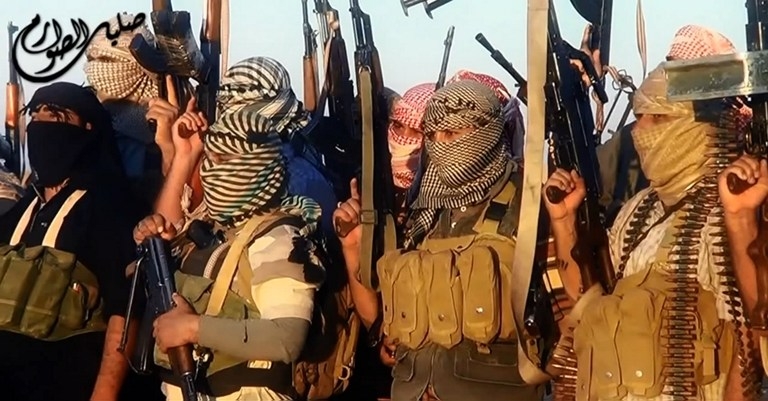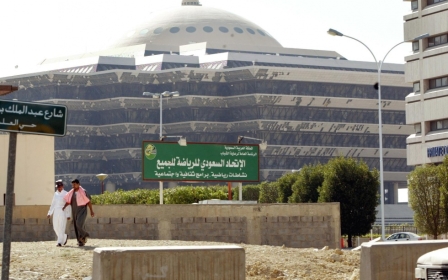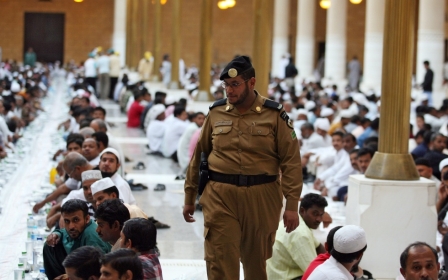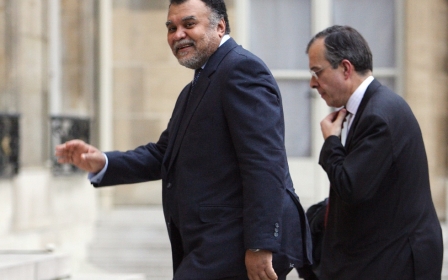Saudi Arabia denies financing IS after allegations by UK ex-intelligence chief

The Embassy of Saudi Arabia in London issued a statement on Tuesday rejecting claims it has been involved in financing or supporting the Islamic State (IS) militant group.
“The Kingdom of Saudi Arabia wishes to emphasise, once again, that it does not and has not supported, financially, morally or through any other means, the terrorist organisation known as the Islamic State of Iraq and Syria (ISIS), Islamic State of Iraq and the Levant (ISIL) and the Islamic caliphate nor has the Kingdom supported any other terrorist network,” said an online statement posted to the Embassy’s Twitter account.
The statement went on to deny apparent British media coverage that alleged the Gulf State had supported IS and emphasised the Kingdom's role in regional counter-terrorism efforts.
“Despite having clarified this issue on numerous occasions, several inaccurate, misleading and distorted allegations, made by certain media outlets in the UK, require us to do so again,” the statement said.
“Saudi Arabia has been at the forefront of combating terrorism both domestically and internationally.”
While the statement did not reference a specific media report, the comments come a day after the former Chief of the British Secret Intelligence Services (SIS), Sir Richard Dearlove, gave a speech admonishing the role played by Saudi Arabia in supporting Middle East insurgencies.
Speaking at the Royal United Services Institute (RUSI) in London, Dearlove recanted an anecdote when Prince Bandar bin Sultan, Saudi Arabia’s head of intelligence until April this year, told him prior to the attacks of 9/11 that there was an impending sectarian war in the Middle East.
Dearlove quoted Bandar as saying: “the time is not far off in the Middle East, Richard, when it will be literally ‘God help the Shia’. More than a billion Sunnis have simply had enough of them.”
While the former intelligence chief acknowledged a split in Saudi Arabia’s leadership over regional policy, he suggested that “they [Saudi Arabia’s leaders] are deeply attracted to any militancy that can effectively challenge Shia-dom”.
He went on to say that there was no suggestion of “direct government funding” but that “maybe a blind eye was being turned” to funding that had been “channelled to ISIL”.
ISIL, now known as IS, has played a public facing role in the advancement of Sunni militant groups across Iraq, which has seen large swathes of the country fall out of government hands in recent weeks.
Dearlove speculated in his speech that the lightning fast moves of a group, which possesses just a few thousand fighters, could not have occurred without external support.
“For ISIS to be able to surge into the Sunni areas of Iraq in the way it has done recently has to be the consequence of substantial and sustained funding,” he said. “Such things simply do not happen spontaneously,” he added.
The financing of IS has been the subject of feverish speculation in recent weeks, with many seeking to make sense of a group that has risen to global prominence in a very short period of time, and while there are those who agree with Dearlove’s assessment other governments have issued starkly different conclusions.
In a report issued in 2006, the US government concluded that the insurgency in Iraq, where IS emanated from, was financially sufficient as early as then, estimating that it was earning between $70 million and $200 million per year from illegal activities.
The majority of these funds were thought to come from oil smuggling aided by “corrupt and complicit” Iraqi officials. Since that report was issued, the group has successfully taken over oil fields in Syria and Iraq, so it is assumed this stream of financing has only increased since then.
Response to Dearlove’s speech has been surprise that such a high ranking British official would issue such damning words about what continues to be a very close ally.
“For someone of Dearlove’s status to cast Saudi Arabia in such a critical light is therefore highly unusual,” Shashank Joshi, a RUSI research fellow in London, wrote in the Daily Telegraph on Tuesday. “It will almost certainly worsen the Government’s already severe angst over the state of the UK’s relations with Gulf monarchies and complicate its frantic efforts to appease Riyadh et al.”
“Saudi Arabia is notoriously poor at distinguishing between the actions of a government and those of others…Riyadh might well vent its anger at Dearlove towards the government,” he added.
The statement from the Saudi embassy on Tuesday gave little indication of a further response from the Kingdom, although they did call on news outlets to scrutinise the funding of IS and report impartially on the region.
“We urge the British and international media to take an in-depth look into the financial backing and organisational structure of this terrorist organisation, as well as to report the situation in the region objectively and fairly and to verify allegations before reporting them as fact.”
New MEE newsletter: Jerusalem Dispatch
Sign up to get the latest insights and analysis on Israel-Palestine, alongside Turkey Unpacked and other MEE newsletters
Middle East Eye delivers independent and unrivalled coverage and analysis of the Middle East, North Africa and beyond. To learn more about republishing this content and the associated fees, please fill out this form. More about MEE can be found here.




